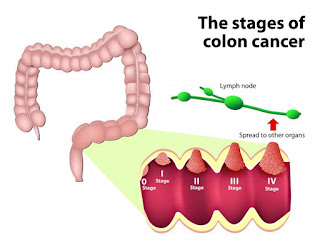Colorectal Cancer
Colorectal malignancy happens in the colon or rectum. The term colorectal tumour is utilized to depict colon growth, rectum malignancy or both. At the point when the malignancy has spread to the liver, lungs or different destinations — treatment can help make the medical procedure a possibility for some, and also be drawing out and adding to one's personal satisfaction. Research is continually being done to take in more and give would like to individuals regardless of what arrange their disease is in.
TYPES
This tumour can start in either the colon or the rectum. At the point when the disease starts in the colon is called colon growth and it starts in the rectum is called a rectal tumour. Most colon and rectal diseases are a sort of a tumour called adenocarcinoma which is a malignancy of the phones that line within the tissue of the colon and rectum. This segment particularly covers adenocarcinoma. Different kinds of disease that happen in the colon and rectum are Gastrointestinal stromal tumours, Lymphoma, Carcinoids.
The stages of colon cancer are:
- Stage 0: This is the most punctual stage, when a tumour is still inside the mucosa, or the internal layer, of the colon or rectum. It is additionally called carcinoma in situ.
- Stage 1: The growth has become through the inward layer of the colon or rectum, however, has not yet spread past the mass of the rectum or colon.
- Stage 2The a tumour has become through or into the mass of the colon or rectum, however, it has not yet achieved the adjacent lymph hubs.
- Stage 3: Cancer has invaded the nearby lymph nodes, but it has not yet affected other parts of the body.
- Stage 4: A tumour has spread to different parts of the body, including different organs, for example, the liver, the film coating the stomach cavity, the lung, or the ovaries.
- Recurrent: The tumour has returned after treatment. It might return and influence the rectum, colon, or another piece of the body.
symptoms and signs of colorectal cancer
Side effects are the same as those of to a great degree normal conditions that are nota disease, for example, haemorrhoids and IBS. At the point when growth is suspected, these side effects more often than not have started as of late, are extreme and dependable, and change after some time. By being aware of the manifestations of colorectal growth, it might be conceivable to recognize the malady early, when it is well on the way to be dealt with effectively. Be that as it may, numerous individuals with colorectal growth don't have any side effects until the point when the malady is propelled, so individuals should be screened consistently.
People with colorectal cancer may experience the following symptoms changes in bowel habits, diarrhoea or constipation, blood in feces that makes stools look black, bright red blood coming from the rectum ,pain and bloating in the abdomen , a feeling of fullness in the abdomen, fatigue or tiredness , unexplained weight loss, a lump in the abdomen or the back passage felt by your doctor , unexplained iron deficiency in men, or in women after menopause .
Risk factors
· older age , a diet that is high in animal protein, saturated fats, and calories, a diet that is low in fibre, high alcohol consumption , ovary or uterine cancer , a family history of colorectal cancer , having ulcerative colitis, Crohn's disease, or irritable bowel disease (IBD) , overweight and obesity, smoking
Treatment
Surgery for colorectal cancer, Chemotherapy, Radiation therapy, Ablation Diagnosis
Screening can detect polyps before they become cancerous, as well as detecting colon cancer during its early stages when the chances of a cure are much higher.







No comments:
Post a Comment